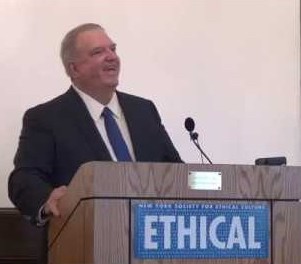By Curt Collier
What makes an action an ethical act? History has shown this question is far trickier to answer than at face value. A version of this question has been pondered since recorded history and seemingly appears in the chronicles of civilizations around the world. The attempts to answer this question have fallen generally into three systems, which philosophers have named deontological, consequentialist (sometimes called utilitarian), and virtue ethical systems.

In brief, a deontological ethical system is usually based on an immutable set of beliefs, such as a list of commandments believed to have been imparted by the gods, and thus an ethical act is simply one that follows those commandments. In a consequentialist system, acts are judged by their results. This requires a goal, meaning if you want to judge the rightness or wrongness of a belief, you have to judge it against a standard. For many consequentialist of the utilitarian stripe, that goal is creating the greatest good for the greatest number of people. Thus, an ethical act is one that leads to the greatest good. Finally, virtue ethics emphasizes less the results of an action, and more the impact it has on the individual. Actions such as those that make us kinder, more compassionate, more just are deemed good, and those that make us meaner, more selfish, or more bigoted are deemed bad.
How do we know what the gods want?
These ethical systems each come with its own set of challenges. A critique of deontological ethical systems is that the moral “agent” here is really the person making the rules (such as a god), but those who simply carry out those commandments really have no claim to acting ethically. Out of fear of punishment or hope of reward they are simply following rules. A second problem of deontological systems is that how do we really know what the gods want? Throughout time, prophets have appeared claiming to know the mind of god and laying down yet another set of rules that over time have conflicted with previous rules. If the rules change, did the prophets make mistakes, did the mind of the gods change, or did the god make a mistake and now has more insight, all of which have severe moral implications.
Consequentialists have their own set of problems. As the philosopher David Hume argued, you may observe the gun in the hand of an individual, and you may see the dead person on the ground with a bullet wound, but what you can’t observe is the ethical implications. We judge the rightness or wrongness of an action based on some internal calculation that itself is not testable, and in fact multiple observers may each come up with his or her own set of conclusions. One favored solution is to merely set a rule, perhaps based on some other set of observations. For example, we can statistically show that abused children are more likely to be abusers themselves as adults unless they seek treatment. Thus, we can set a rule that it is wrong to abuse children and right to seek healing if abused in order to break this cycle. But once again, we’ve merely created a rule that satisfies our need without knowing really if that is indeed the best outcome. When we look at the generations of those who went before us we can see a whole host of actions that we now deem “unethical” but were acceptable at the time. A hundred years from now will people judge our beliefs the same way?
Who determines what ‘good’ means?
Finally, virtue ethics doesn’t get a pass, either. What does it mean to be a good person, and who determines that? Aphorisms such as “look before you leap” and “he who hesitates is lost” are simple examples of differences in opinion that happen all the time. Moral choices are far more complex. Is it best to be stoic and merely stand unmoved by the transgressions of this world, or to act for change? Recalling Philosophy 100 from college, is it wrong to lie in all circumstances? (Kant thought so). But what if a gunman breaks into your house hunting for a family member? Is it wrong to lie about their whereabouts? Even the Golden Rule (“Do onto others as you would have them do onto you”) is fraught with challenges, as Bertrand Russell argued. If I believe in a strict form of justice, such as “an eye for an eye,” does carrying out retribution against another really make me more just?
So we’re back to square one: What makes an action an ethical act? The physicist Steven Hawking, when thinking through the contradictions between relativity and quantum mechanics, once suggested that if we keep getting the wrong answers, perhaps there’s something wrong with the questions we’re asking. Perhaps we can apply that here. What if we’ve been thinking about ethics in the wrong way, and that ethical living is something very different than heretofore explained?
Curt Collier is interim leader of the Ethical Culture Society of Bergen County.


